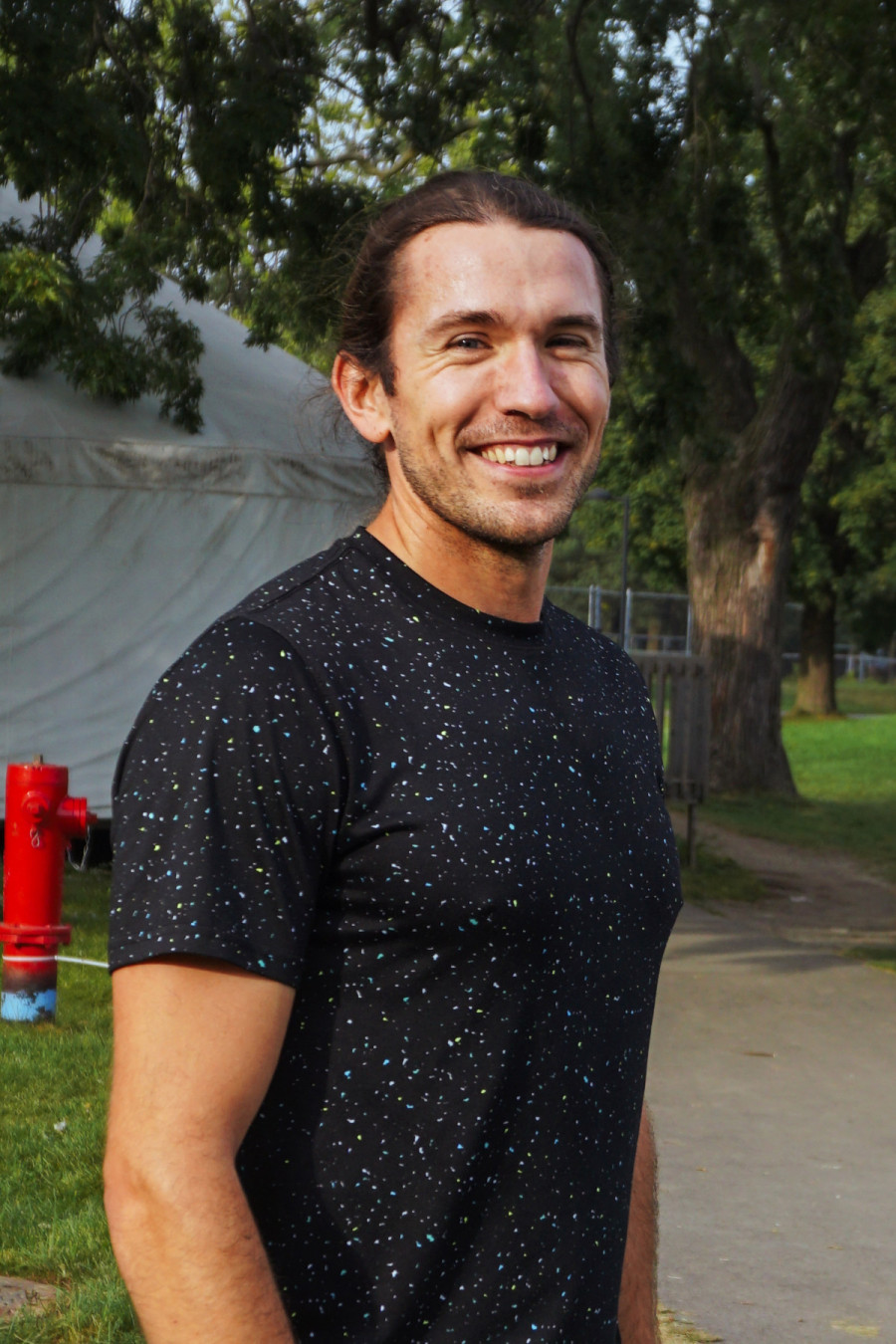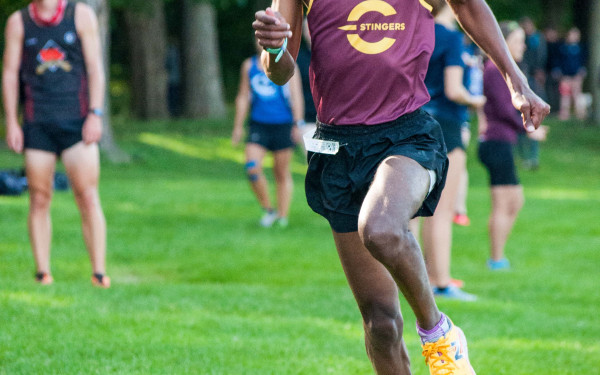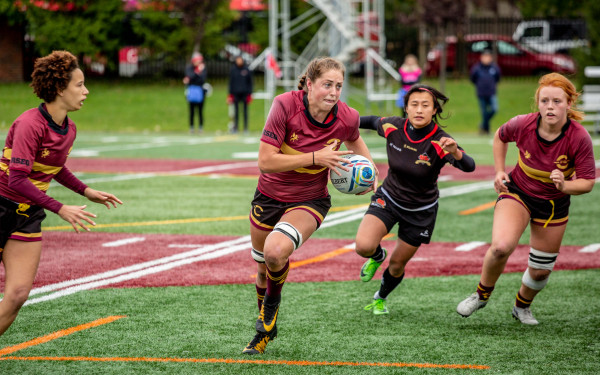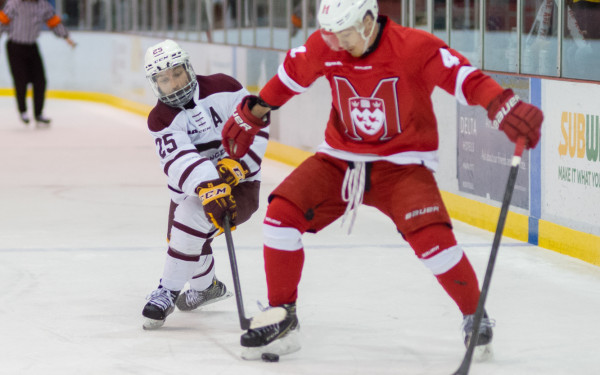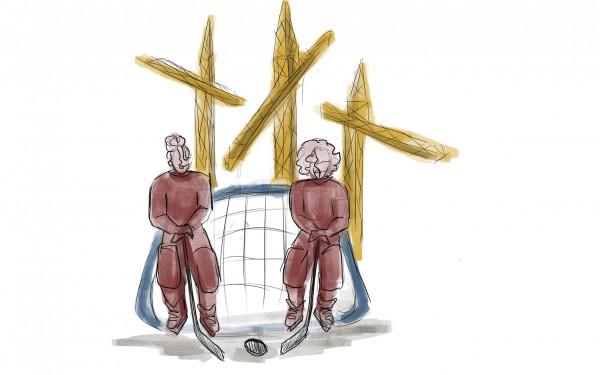James Lavallée: Teammate, leader, friend
The Concordia cross-country athlete is making waves in his community
When James Lavallée first stepped onto a track field last fall, he was uncertain how well he would perform and if he would be accepted by his peers. Little did he know that his engagement with the Concordia cross-country team would be beneficial for all those involved.
“I quickly realized how out of shape I was,” joked Lavallée about how physically unfamiliar he was with running. Despite this, his fellow cross-country runners were eager for him to train up and join. The welcoming atmosphere was appreciated by Lavallée who is still quite new to Montreal.
Lavallée moved to Montreal in 2021 where he enrolled in Concordia’s management program. Needing a new challenge physically, he joined the university’s track team.
Lavallée has always been involved in organized sports. At the age of 11, he began paddling in his hometown of Winnipeg, Man. Having had difficulties in school, the water sport was the first activity he saw himself improving at. After his retirement from paddling in 2019, his list of accolades includes a gold medal at the National Championship in the K1 200-metre race, Team Canada flag bearer at the World Junior Canoe/Kayak Championships in 2014, receiving the Tom Longboat Award—presented to the top Indigenous male and female athletes of the year—in 2017, and beyond.
Despite the impressive competitive resume, Lavallée takes more pride in his community work back home in Winnipeg. As a Red River Métis man, Lavallée combined his love of canoeing with the sport's deep roots within the community, starting an organization called Waterways Recreation Inc. in November 2019. Lavallée—alongside fellow founders Tristan Schneider, Denis Lavallée, Sam Anthony and Mo Crossman-Serb—established Waterways with the mission of “supporting community wellness by using canoeing and outdoor recreation to connect Indigenous youth to cultural skills and identities,” according to the organization’s website.
“A lot of it is about creating spaces where kids can be kids,” explained Lavallée. “The philosophy in Waterways has really been [...] we ask the kids what they want to do, and then we adapt the programming to the vibe.” For Lavallée, the goal is to give the youth participants a sense of autonomy along with their communication skills and respect for cultures.
Lavallée has found Waterways to be successful. With the solid amount of participation and communal appreciation, the organization led to an interesting opportunity for Lavallée; speaking in front of Prime Minister Justin Trudeau in May 2023.
“I don’t even know how that happened,” said Lavallée. The work of the foundation has become well-known in the Red River Métis community. The Prime Minister had planned an announcement on the water agency coming to Manitoba while planning to meet youth participants simultaneously. Waterways was asked if Trudeau could attend one of the programs set up. Lavallée remembered how cool the experience was while also highlighting the work Schneider did to organize the whole event.
“[Trudeau] actively participated in the program, asking questions,” said Lavallée. Along with the roughly 20 high school students in attendance, Lavallée and other Waterways members did a plant walk with Trudeau and explained how to introduce oneself in Michif, the mother language of the Métis.
Lavallée is learning the language himself. He has incorporated Michif into his community engagement. The language is composed of components of French and Cree. For Lavallée, Michif is emblematic of the Métis culture.
According to Lavallée, only ten individuals speak Michif as their maternal language. Preserving the language is challenging, especially considering it is mainly oral with no standardized written format.
Despite these obstacles, Lavallée remains hopeful for the future of the language, latching on to the sense of community and cultural significance.
Lavallée’s compassion has become additionally apparent among his Concordia track mates. Many members of the cross-country program have been quick to remark about the impact he has made in just the brief period he has participated on the team.
Head coach John Lofranco first met Lavallée at a spring training session in 2021. Lofranco appreciated Lavallée’s maturity and organizational skills as it sets a proper example for other athletes joining the squad.
_900_1350_90.jpg)
“I have one story,” said Lofranco. “The Université Laval has had a team cheer for years…”
“The Tomahawk chop,” said Lavallée, laughing at the ridiculousness.
While attending a meet at Université Laval, one of Lavallée’s teammates pointed out the cheer coming from the Rouge et Or’s side. The cheer itself originates from the Florida State Seminoles football team, where the entire stadium emulates a chopping motion while imitating a Native American war cry. Laval adopted the cheer, and Lavallée—with the support of Lofranco—thought it would be best to educate the host team about the cheer’s inappropriateness.
“I was thinking that if there were other Indigenous athletes coming to compete at this level, that it’s very distressing,” said Lavallée. “I didn’t think they were doing it maliciously, but my assumption was that it probably came from a place of ignorance.” The Laval team was receptive and agreed not to continue with the cheer.
“I just thought it was incredibly mature of James,” said Lofranco. “I think that some people in that situation would want to jump all over it, do a social media post and out the team [...] [Lavallée] didn’t do it because he thought they were hateful, he wanted them to be informed.”
Lucas Graham has been friends with Lavallée for roughly a year. The two met on the cross-country team and hit it off right away. They met at a morning training session in the gym.
“He struck up the conversation,” said Graham. “It’s something I see a lot. He’ll introduce himself, as he’s very outgoing.”
As the two grew closer as friends and teammates, Graham started to appreciate Lavallée’s charisma. Graham reminisced about meets where Lavallée brought the team boxes of assorted candy, sandwiches and orange slices. Graham beamed while chuckling at his friend being “the team dad.” Graham said he tries to instill some of Lavallée’s values in his own life.
“As I talk to him more and more, I realize this is the type of guy I want to be associated with,” said Graham. “Even though he’s chill and laid back, he’s a go-getter [...] This guy isn’t going to sit back and let life pass him by.”
Lavallée remains humble about his accomplishments, emphasizing the lessons he learned through his challenges with school at a young age, and in some areas of competition.
“It sounds boasty, but the best is yet to come,” said Lavallée. “I hope that the work in community uplifting, language revitalization and land-based programming eclipses everything else I’ve done.”
This article originally appeared in Volume 44, Issue 3, published October 3, 2023.

